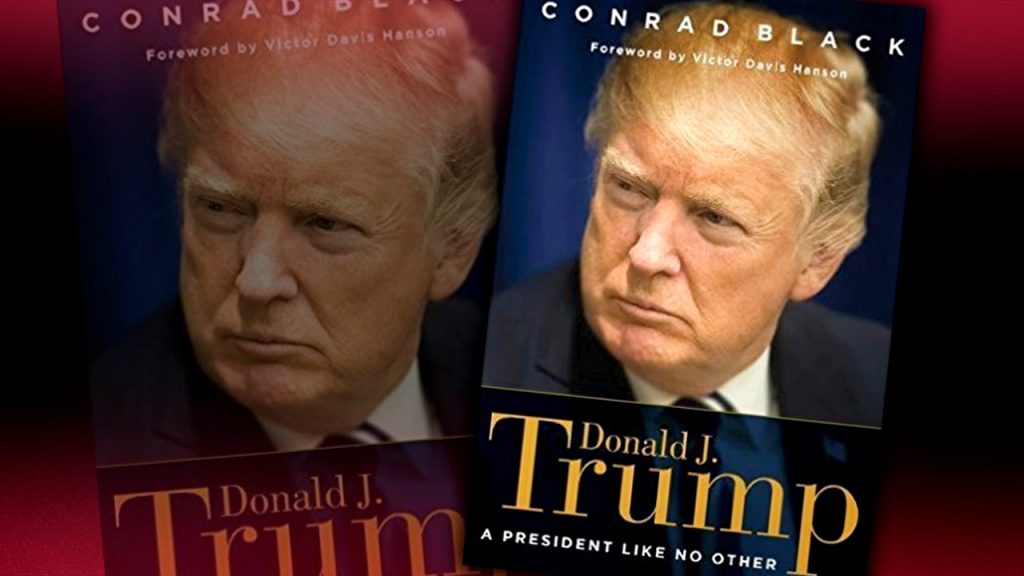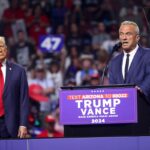Blog Post
Never Trump, the Left, and a President Like No Other: A Conversation with Conrad Black
By Jonathon Van maren
Earlier this week, Conrad Black was kind enough to join me for our third interview (the previous two being on his book on the history of Canada and criminal justice reform). This time, our topic was his fascinating new book, Donald J. Trump: A President Like No Other. Below, with my questions in bold followed by his answers, is that interview.
Would it be fair to say that Donald Trump is the American president you know the best from a personal perspective?
In terms of seeing him and working with him, yes. In terms of having serious discussions on substantive matters at length I would have to say Mr. Nixon was. But of course Donald Trump and I are approximately the same age, so it was a different basis. I was speaking to Mr. Nixon as an ex-president and he was a generation older than I. In that sense, prior to [Trump’s] elevation to his great office, being friendly with him on an eye-to-eye basis, as a neighbor and that sort of thing, you would be right, certainly.
One of the things that has struck me as interesting about Donald Trump is the principle of loyalty which you note in A Matter of Principle, when you refer to Trump sticking by you during your legal ordeal. This principle seems to carry through in other areas, as well—for example, Trump had been very pro-choice up until quite recently, and people have speculated that the loyalty of certain segments of social conservatism to Trump has prompted loyalty in return. You touch on this in the book, but what is your take on it?
As a historian I’m always very careful about mindreading. It is terribly difficult to know what is in the minds of these people, and particularly so when they don’t hint at what it might be. In his case, you’ll recall the occasion where he went on television and gave a guarded comment when asked about partial-birth abortion, having no clue what it was, but once he found out what it was, he was opposed to it. I think what has happened is first of all, he had conventional New York limousine liberal views, the Michael Bloomberg, slightly left-of-center, as long as it’s possible to run your business properly. And then as he got out around the country more and his political ambition crystallized, his views authentically became more respectful of those people whose votes he was soliciting. He knew if he was going to win, it wasn’t going to be on Fifth Avenue and Park Avenue. He would win the disgruntled blue-collar people who felt abandoned, various categories of people who tend to be somewhat conservative.
And he did, I think quite genuinely, adjust his views as he became more knowledgeable about the insusceptibility of some of these questions to flippant answers in the great salons of Park Avenue and Fifth Avenue. That’s a milieu I know well myself because I lived on Park Avenue. They’re often very interesting and talented people, but their view of the world comes from a rather exalted altitude.
The reaction of the various commentators to Trump has been somewhat predictable—the Left, with people like Bill Maher, are promising the public that this time the Republican president really is Hitler, which they also said about Romney and Bush and all the rest. But on the Right it has been quite different, with people I believe you are quite friendly with, like George Will, also being quite contemptuous of Donald Trump. So I guess the question I wanted to ask you after reading your book is this: What do you see that they don’t see?
The whole thing is rather painful. I mean, some of these people are very close friends of mine and we just can’t discuss that. There’s just no point to it. They are not rational on the subject. It’s not as if I am blind to the gaucheries of Trump at times, although I think they are becoming much less pronounced and much less frequent. In order to answer you, I would have to try experiment in mind-reading, but as I say it’s not history, it’s not science, it’s just a guess, because is it isn’t obvious what their reasoning is. In the case of George Will, he does seize upon very minor things to demonstrate that Donald Trump is, as he put it, a vulgarian. Well, to some degree he is a vulgarian, but he is an educated man and as I mentioned in my book, whether George Will or David Frum or the other like-minded people like it or not, the objective fact is that Trump accomplished more before he became president than any previous holder of that office except Washington, Jefferson, Madison, Grant, and Eisenhower. He made billions of dollars, he was an astonishingly successful television star from his first attempt at it and without a week’s interruption in fifteen years, he held an audience of over twenty-five million. Now, the fact that it isn’t the kind of television that George Will or I watch has nothing to do with it. It’s a great accomplishment.
He became technically insolvent and made a tremendous comeback from that, and he took over a great political party never having held or sought any public office, elected or unelected, or held any military command, and was in that condition elected president. I understand that there are times where you can scratch your head and say, “Good grief, this is a very strange person to be the occupant of that position, the direct successor to George Washington,” but on the other hand, nobody can fairly and honestly deny that he has been astonishingly successful and he is very talented. I think that with the people you’re mentioning, it’s a little different with them. I mean, David Frum, Rich Lowry, John Podhoretz, Bill Kristol, Max Boot, George Will, it’s a bit different with each of them, because they’re different people.
But you get a combination of these elements: They thought it was their turn to take back the Republican Party and have a sort of Reagan party. Now, they had no candidate to give them a Reagan party, but that doesn’t seem to have registered and those whom they supported as alternatives to Trump were not the same person. They all ended up holding their noses and supporting Cruz, but that’s because he was the last one standing. They felt that they had been in the wilderness in the Bush-McCain-Romney years and it was their turn to come back and it was not going to be with Trump. So there was a sense of frustration in that.
They find him, as the cliché goes, unpresidential, and believe the president should be more verbally cautious. And they are, as journalists, I think, all miffed at the shambles Trump has made of the ability of the national political press corps to elevate and demote people in public opinion. That’s part of the revolution he’s conducted. He’s assaulted the national political media including these commentators, and has said that he regards them as pompous, out-of-touch misanthropes. He wouldn’t use those words, but that’s what it amounts to. And then you get a sort of snobbery involved. He quite clearly has paid no court to those people at all, and they don’t like it. They’re not used to it.
So at a human level their response to him is understandable, but from such intelligent men who should approve, and I think probably—you see this with Podhoretz and Rich Lowry, my editor at the National Review—they’re starting to make this distinction. David Brooks is starting to do it a bit, too: We don’t like this man, we don’t think he’s an appropriate personality to be president, but we must say that we do approve of much he’s doing. So he’s starting to pull them on the policy side. I think when they get a good look at just how far Left the Democrats are going, and how out of control they are, and especially if Trump continues to notch up successes and makes any gestures to them at all, that chasm will narrow.
I don’t think you’re going to get anywhere with the old Left, like Bill Maher and these lunatics in Hollywood. I mean, I always admired Robert de Niro as an actor but the things he’s said are simply shocking. One hesitates to use these words, but they border on sedition at times.
It interesting that you bring that up. Last weekend, Bill Maher compared the resignation of Anthony Kennedy to the fall of France in 1940, and Michael Moore urged a million people to march on Washington and seize control of the Capitol stop the confirmation hearings of a Trump Supreme Court nominee from happening. To what extent is this sort of rhetoric dangerous?
Well, it isn’t really dangerous, it’s tactically stupid, apart from being outrageous. The great American people are not going to resort to violent revolution. The country is at peace—it takes the odd military casualty, and obviously every one is a tragedy, but sorrow does not come to a large percentage of American homes as in a world war or even in Vietnam. They now have more jobs to fill than they have unemployed people, low tax rates, booming economic growth—the fact is we’ve finally reached a point where China is not objectively gaining on the United States in GDP. The currencies and the purchasing power of the currencies jump around, but finally they are not gaining on the US because US economic growth has revived so much. Those are not the circumstances which breed violence.
Those people are talking to themselves. They are getting backed, by themselves, steadily into a corner where they stand for open borders, the arrival of anyone who wishes to enter, and they are immediately entitled to vote as well as full access to the education and social security systems. They stand for a reversal of the tax cuts and they stand for the impeachment of the elected president with absolutely no tincture of a right to accuse him of the high crimes and misdemeanours that are required for that to be carried out. They have become a party of lunatics. That might work for a peppy 28-year-old Puerto Rican girl in the Bronx Congressional district, but it’s not going to fly with the country.
Trump is going to run a midterm such as has never been seen. Presidents can campaign in midterm elections, and I think he’s going to campaign as if it was an election and put a lot of money into it—the Republican National Committee has a lot of money. He’s going to punish these people for their extremism and the stupidity of the policy proposals they make and for their defamation of him. They’ve called him Hitler, every single thing he’s set out to do they’ve described as a disaster, and of course he hasn’t been the author of any disasters. They’re going to pay for it. Michael Moore calling for a million people to overturn the government, in my opinion, is dangerous to the Democrats. There’ll be some scuffling with police, but the security in the US federal buildings is maintained by the First Division of the United States Marine Corps. A gang of demonstrators, no matter how numerous, mobilized by Michael Moore are not going to be overturning anything.
In your book you talk about how Trump correctly identified issues that the populace was passionate about but that everyone else was ignoring, including the conservative establishment, who simply did not identify with the issues that the populace did, while Trump with his instinctive knack for understanding what the people want pulled off something so unheard of that nobody realized he’d pulled it off until the Indiana primary. You think he’s going to take that to the midterms as well?
Oh yes. He’s refined it a bit, and he’s moderated the tone slightly, but he’ll do it and he’s very effective at it. As you know, he has astonishing energy so at least once a week he goes out into the hinterland of America—last week I believe he was in both South Carolina and North Dakota just a couple of days apart—and since he doesn’t sleep he doesn’t care if he doesn’t get back to Washington until 3 AM or 4 AM, or he can sleep on his plane anyway. He gives the message and the media are hungry for content so it is telecast live and they pack out the local football stadium, pack them in like sardines, he whips them up, and it’s pretty good-humored you know, it’s not Madonna saying “let’s blow up the White House” or Michael Moore saying let’s overturn the government, it’s just mocking what is easily singled out and disparaged in the conduct of his opponents.
So he’s focusing on Maxine Waters. Maxine Waters has been making inflammatory and outrageous incitements to violence and civil disobedience for twenty years or longer, and she provides a rich load of material for him to focus on. Some of the comments of Pelosi and the others, and Moore if his parade or demonstration gets anywhere, that’ll be another one—the fact is that the silent majority of Americans are there and they’re always there, they’ve never cracked. Even in the Civil War they didn’t crack. As George Will himself says—and I’m not a person well-qualified to use a sports metaphor—American politics is between the thirty yard lines, and if you go towards the end zones you’re not going to win.
But I see George Will is now pushing my friend Bill Weld to be a third party candidate for president. No third party candidate has ever done anything but throw the election to the party he liked the least. Theodore Roosevelt, even though he was the most popular man in the country–his effect was still to put Woodrow Wilson, the Democrat, in the White House. It’s nonsense, and these people will act out their theatre but it has nothing to do with how the inexorable American political process operates, and they will re-elect a president who has done what he said he would do, and it has clearly benefitted the country. That’s what they’re going to have to deal with. I’ve been to dinner at George Will’s house. I accept that the last person he would invite is Donald Trump, but the fact is that as a dinner guest he is a delightful man. He is very entertaining, very courteous, he never speaks over people, he listens, he’s not boastful, and he is not the caricature that his enemies make of him.
I understand the people who didn’t support Trump all the way through the primaries. I understand people who ranked him last of all the Republican candidates that were available. What I fail to understand, and what so many rank and file conservatives fail to understand, is how people like David Frum could vote for Hillary. The idea that you can be a conservative and value conservative principles but yet despise Donald Trump so much that you would vote for someone who embodies the antithesis of all conservative values—people are simply starting to question whether they ever believed in conservative principles to begin with, or alternatively, whether Trump has unleashed some sort of hysteria that defies explanation. Could you explain that?
It varies from person to person. In the case of David Frum, he has moved around quite a bit. As a younger man, he was quite conservative. You may recall he wrote a book at the end of the Reagan Administration that criticized Reagan for being inadequately conservative. Then he joined the George W. Bush Administration, but he was dismissed when his wife sent a note around saying that David had coined the term “Axis of Evil,” and that showed what a shallow man George W. Bush was. David is a good friend of mine, he has been for a great many years, and so is his sister, and so were his parents. I don’t think he is very conservative, and you could see it in the Obama years. He’d go and talk to Obama, and he was a middle-of-the-road, independent voter, really. His endorsement of Hillary Clinton and his continued unapologetic affirmation that he did the right thing in supporting her indicates to me that he’s one of these people who political views do evolve, and I don’t think he is conservative. Certainly I don’t think the conservatives think he’s conservative. I think today he’d qualify as a moderate liberal who would advocate sensible policy in each case but with not any discernable ideology to it.
This book is probably the most articulate defence of the president so far. When you hear people criticizing him, which of the arguments that Trump’s critics make do you find understandable?
I understand them. I sometimes wince myself at the inelegant things Trump says, but I think he says less and less of that and looks and sounds more and more like a confident and competent president as time goes by. And like all of us, although in more mundane activities, the more we do something, the better we get at it. I think that’s what’s happening. The early days were, as Brit Hume, the FOX News commentator called them, a floating crap game in the White House. People were coming and going, Scaramucci came in and got roaring drunk and gave that unimaginable interview to the New Yorker, and he was gone a few days later. It was a revolving door. Disloyal people, holdovers from the previous regime, were leaking to the press whole recordings of conversations with foreign leaders. I mean, this is completely illegal and outrageous and I never heard of such a thing in the White House. I never heard of it happening to any previous president. Even at the worst of times Nixon wasn’t subjected to that.
But it’s all settled down. He has a stable staff. I don’t think you can easily criticize his key people—Pompeo and Mattis and Mnuchin are obviously very capable, and General Kelly has certainly got a brisk professional operation going on at the White House—it’s all settled down. By way of example, a friend of mine from Quebec has a grandson who is in a distinguished choir in Philadelphia, and at the end of their school term they have a great concert that is very widely attended. Last year, there was a valedictorian who urged listeners to prepare for virtually an Orson Welles War of the Worlds with the lunatic in the White House and so on, and this year there wasn’t a trace of any of it. Imperceptibly but gradually it is all settling down, and he’s going to get judged as a president like other presidents. So at the end of it he won’t be a president like no other, he’ll be another president, and at current form a rather successful one. He had to get used to the job and the country had to get used to him.
We have to remember that he did declare war on the whole system. He said [that] it is all rotten, the lobbyists, the campaign finance techniques, the inside-the-Beltway political monopoly, all the factions of the parties—they’re not talking about real issues, they’re just passing the country back and forth between the Bush and Clinton family. Thirty-two years in a row one or the other of them was president, vice president, or Secretary of State. All of that happened to be true. It was a shocking revelation, and the real shock, as you implied a few minutes ago, was that those whom you would think would be the most sensitive to these things were those least aware of them. Neither establishment in either party, nobody in the national media, had any idea how much discontent there was, and it is a benefit to the country that Trump, whatever anyone thinks of him, is very much a defender of the Constitution and a supporter of the continuity of the system, with some reforms, and not some fire-breathing radical who wants to blow up the great federal buildings of Washington.
But as I said before, he and Hillary Clinton managed to keep their parties reasonably close to the center. If Trump fails, we’re going to have the next election between a far-out Cruz-ite and a far-out Sanders-ite, and then you really will have stresses in the country. I don’t think it’s going to happen, because I think this administration obviously is producing an increased prosperity and a declining level of public anger. So it’s hard to think of this as each week there’s some new bit of nonsense from someone in Hollywood or the Democrats are doing cartwheels over some frankly rather minor issue, but you remember they burst into tears over the temporary restriction over arrivals from certain terrorism-tainted countries—that’s now been declared constitutional. All this nonsense about the president being a sexist or a racist—all that’s collapsed. The Russian collusion thing—utter nonsense, not a word of truth to it. It’s all settling down like a souffle. I think that’ll continue.
One final question. If you had to make a prediction for the rest of Trump’s term—you say it’s all settling down now, you’re looking forward to the rest of his agenda—how would you say this is going to play out?
There is a pattern in American politics where an opposition party, where it has lost very narrowly, can, just by some natural process, take a jag off the beaten path and nominate someone who really is outside the electable center of the political system. That happened to them in ’64 with Goldwater—I don’t doubt Goldwater was a good man, but I never understood the enthusiasm of Bill Buckley and George Will and others for him because at the time, I thought it was quite clear that he was in effect saying the segregationists could continue, in the guise of promoting states’ rights, basically keeping African Americans out of schools and that sort of thing, and you just couldn’t do it, it was an outrage, it was wrong, and Johnson won a huge majority. And in ’72, the Democrats went for McGovern, who as even the New York Times said, was advocating for a peace in Vietnam more humiliating than what Hanoi was asking for.
Mr. Nixon had extracted them from the Indo-Chinese conflict while maintaining a non-Communist government in Saigon, he was abolishing the draft, he’d signed the greatest arms control agreement in history with the Soviet Union, starting the end of the Cold War, he’d reopened relations with China, started the peace process in the Middle East, founded the Environmental Protection Agency, no riots, no hijackings, everything was quiet, prosperous, no inflation, and he won a tremendous majority. The precedent for those two—Johnson and Nixon—on the heels of their great victories, they each had a terrible sleigh ride right after that, but that was because of mistakes they made.
But in the case of Trump, my impression is that the Democrats have no plausible leader to put up as a candidate for president, and the party is clearly well to the Left. The one thing that may enable them to make a serious challenge to Trump in two years is if he hammers them so badly in the midterm elections that they come to their senses prematurely and produce a centrist candidate who attacks the president on legitimate issues and says, “I can do these things better than he is.” Then you would have, I suppose, a fairly close election. But as of now, it looks to me like Trump has done it carefully step by step—he’s taken chunks of the electorate, one after the other.
He’s rising fairly steadily in the polls, and now he’s cracking the solidarity of the Democratic hold on the African American vote, and my impression is he’s going to pardon a great many people and say look, all these first-time, non-violent offenders have been over-sentences, and I’m releasing them. I’m not pardoning them, I’m commuting, and we’ve got to stop this business of over-punishing people. The African American vote is not so locked into the Democrats as they think it is, and they’re cooperating in their own demise here. The United States has a Left, certainly, it has a well-developed, articulate and often rather imaginative Left, but it certainly does not have a Left that has any chance of securing a majority of the American voters.









What a concise Interview! Good questions and responses a la Conrad. Enjoyed it!